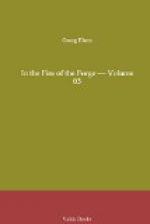Having no alternative, he curtly assented, and was somewhat soothed as he saw old Count von Montfort, who was still standing beside Els, engaged in an animated conversation with her. His daughter’s presence was probably due to that of the guests quartered in his home, especially Cordula, whom, since she disturbed the peace of his quiet household night after night, he regarded as the personification of restlessness and reckless freedom. He would have preferred to pass her unnoticed, but she had clung to his arm and was trying, with coaxing graciousness, to soften his indignation by gaily relating how she had come here and what had detained her and her companions. But Ernst Ortlieb, who would usually have been very susceptible to such an advance from a young and aristocratic lady, could not now succeed in smoothing his brow. In his excitement he was not even able to grasp the meaning of the story she related merrily, though with well-feigned contrition. While listening to her with one ear, he was straining the other to catch what Sir Seitz Siebenburg was saying to his father-in-law, Casper Eysvogel.
He gathered from Countess Cordula’s account that she had succeeded in playing some bold prank in connection with Els and the Swiss knight Heinz Schorlin, and the words “the Mustache” was whispering to his father-in-law-the direction of his glance betrayed it—also referred to Els and the Swiss. But the less Herr Ernst heard of this conversation the more painfully it excited his already perturbed spirit.
Suddenly his pleasant features, which, on account of the lady at his side, he had hitherto forced to wear a gracious aspect, assumed an expression which filled the reckless countess with grave anxiety, and urged the terrified Els, who had not turned her eyes from him, to a hasty resolution. That was her father’s look when on the point of an outbreak of fury, and at this hour, surrounded by these people, he must not allow himself to yield to rage; he must maintain a tolerable degree of composure.
Without heeding the young Burgrave Eitelfritz or Sir Boemund Altrosen, who were just approaching her, she forced her way nearer to her father, He still maintained his self-control, but already the veins on his brow had swollen and his short figure was rigidly erect. The cause of his excitement—she had noticed it—was some word uttered by Seitz Siebenburg. Her father was the only person who had understood it, but she was not mistaken in the conjecture that it referred to her and the Swiss knight, and she believed it to be base and spiteful.
In fact, after his father-in-law had told him that Ernst Ortlieb thought his house was on fire, “the Mustache,” in reply to Herr Casper’s enquiry how his son’s betrothed bride happened to be there, answered scornfully: “Els? She did not hasten hither, like the old man, to put the fire out, but because one flame was not enough for her. Wolff must know it to-morrow. By day the slender little flame of honourable betrothed love flickers for him; by night it blazes more brightly for yonder Swiss scoundrel. And the young lady chooses for the scene of this toying with fire the easily ignited warehouse of her own father!”




